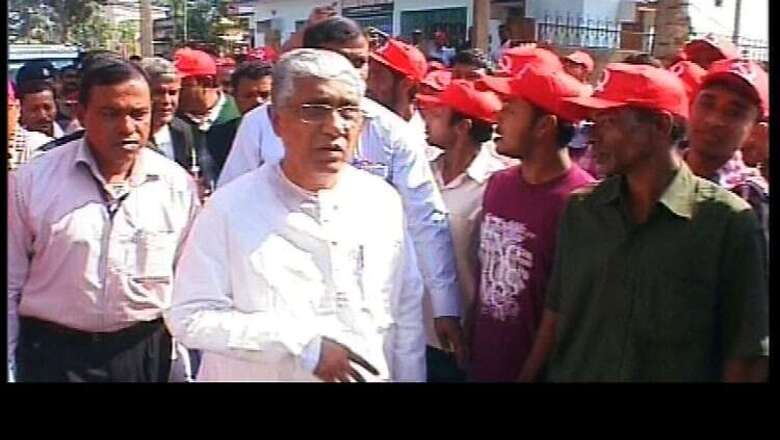
views
Militancy in Tripura became a marginal affair much before Chief Minister Manik Sarkar could convince all stakeholders that insurgency in the state was indeed on the decline and peace was consolidated. Tripura has withdrawn the Armed Forces Special Powers Act after 18 long years. This withdrawal is a testimony to the balanced employment of force and good governance. The South Asia Terrorism portal bears in numbers what is more than evident in the towns of Tripura. The number of insurgency related deaths (civil, security forces, militants) declined from 2009 when there were 11 casualties. The state saw none in 2013, the year after it recorded one death. This is in sharp contrast to 2004 when militancy in the state claimed 514 lives, including 453 civilians, 45 militants and 16 members of the security forces.
"Insurgency activities in the state are now reduced almost at zero. The demand for withdrawing the AFSPA has been persuaded at various levels, but we could not take a decision because the security forces did not clear it," Sarkar said while announcing the move.
A full report was asked for when the latest extension came up for renewal and this time security agencies agreed to the proposal of lifting the Act. The Centre too backed the move and played ball, a political move that also needs to be underlined. The Centre's nod remains crucial especially in absence of clarity over what defines a 'Disturbed Area' and the necessity of consultation with the state. The Supreme Court in its 1997 order in the popular NPHMR case (Naga People Movement for Human Rights vs Union of India) said there is 'no requirement' but it is 'desirable' that the central government consults the state government before making the declaration.
It would be prudent to remember how a bolt from the blue hit Arunachal Pradesh not too long ago when the Centre invoked the Disturbed Areas Act and thereby extended the AFSPA in 12 districts of Arunachal. There have been occasions in the past when the Nagaland state assembly has passed resolutions against the extension of the Disturbed Area Act and each time the resolutions were ignored by the Central government. So except Mizoram and Sikkim, much of what we call the North East is made of 'AFSPA states', where AFSPA rules and governs along with the state government. The Act is applicable in Assam, Nagaland, Manipur (barring Imphal Municipal area) parts of Arunachal and Meghalaya.
About six odd years ago the Army and the Assam Rifles facilitated a group of journalists to Tripura for an on ground assessment. Many of those were part of that group filed reports on the incremental advances that were being made; nearly all of them spoke of co-operation between the Tripura government and the Army, a serious show of intent and a lack of ego/one-upmanship in the entire counter insurgency relationship. The rebels were kept on the run and under pressure. Co-operation from the neighbouring Bangladesh also ensured that there were no sanctuaries for rebel groups across the border.
Pradip Phanjoubam, the Editor of the Imphal Free Press was part of the group and filed a narrative on a surrendered NLFT militant, 29-year old Sanjay Jamatia who spoke of why he surrendered, 'There was no food to eat, no clothes to wear. No hope that we would ever succeed'.
The same maybe true for cadre of many insurgent groups in 'AFSPA states' but there are several other factors that keep them away from the same success Tripura had. Not to forget that tribal militancy ran counter to the majority Bengali population in Tripura.
In states like Manipur the genesis of insurgency is elsewhere. Demand for the repeal/withdrawal of AFSPA has centered on human right violations and the overwhelming presence of the security agencies. Politicians across hues have given nothing more than lip service to these demands, their strong links with more than one insurgent outfit being part of the problem. Manipur is an apt example where protests against AFSPA rule the street but AFSPA remains out of the political mind space.
Whether issues like AFSPA and its repeal should be seen from an electoral prism can be up for debate, but an on ground, assessment of security agencies have drawn several arcs of concern, especially after the NSCN (Khaplang) withdrew from the ceasefire with the Government of India. The Myanmar based Chairman SS Khaplang unilaterally retracted from the 14-year-old ceasefire agreement a month before it was due for an annual renewal. The government of India says it has continued to maintain its side of the agreement. Neither the ceasefire nor its withdrawal has dented the groups' insurgent capabilities in the region. Armed NSCN (Khaplang) cadres roam freely in the Naga Self-Administered Zones in Myanmar close to Nagaland and Arunachal Pradesh and provide refuge to other insurgent groups.
Within the territorial boundary of Manipur there is increasing frustration and claustrophobia at how the government is handling Suspension of Operation (SoO) agreements with cadre groups that have surrendered but are housed in makeshift camps. Currently about 19 underground groups stay in these 'safe houses'. On my last trip to Manipur, in February this year there were enough examples of brazen violations-of cadres roaming freely with arms, of 'recycled militants', of heads of insurgent outfits running off with allocated funds and of small fry insurgencies keeping the pot simmering. Not to mention the ever dragging Naga peace process and its constant spill over in Manipur.
Tripura has shown the way to withdraw AFSPA, political will, smart governance and an effective utilization of the force. Where Manipur could also earn from Tripura is its relatively clean and corruption free image that has kept the political leadership and the bureaucracy, a notch higher.
Manik Sarkar once had the distinction of being India's poorest Chief Minister who had bank deposits worth Rs 10,000. The same can certainly not be said for Manipur where sections of the political leadership, bureaucracy, Army and the insurgent groups all benefit from its biggest industry, AFSPA and thus perpetuate its continuance.
(Anubha Bhonsle is Executive Editor, CNN-IBN. Her forthcoming book “Mother, Where’s My Country?’ is a book of reportage that examines the impact of AFSPA in Manipur)



















Comments
0 comment